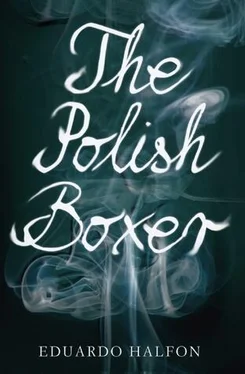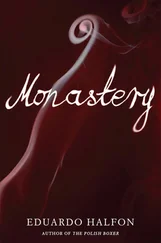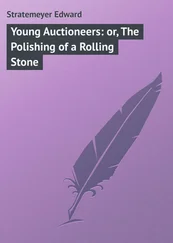Eduardo Halfon - The Polish Boxer
Здесь есть возможность читать онлайн «Eduardo Halfon - The Polish Boxer» весь текст электронной книги совершенно бесплатно (целиком полную версию без сокращений). В некоторых случаях можно слушать аудио, скачать через торрент в формате fb2 и присутствует краткое содержание. Год выпуска: 2012, Издательство: Bellevue Literary Press, Жанр: Современная проза, на английском языке. Описание произведения, (предисловие) а так же отзывы посетителей доступны на портале библиотеки ЛибКат.
- Название:The Polish Boxer
- Автор:
- Издательство:Bellevue Literary Press
- Жанр:
- Год:2012
- ISBN:нет данных
- Рейтинг книги:4 / 5. Голосов: 1
-
Избранное:Добавить в избранное
- Отзывы:
-
Ваша оценка:
- 80
- 1
- 2
- 3
- 4
- 5
The Polish Boxer: краткое содержание, описание и аннотация
Предлагаем к чтению аннотацию, описание, краткое содержание или предисловие (зависит от того, что написал сам автор книги «The Polish Boxer»). Если вы не нашли необходимую информацию о книге — напишите в комментариях, мы постараемся отыскать её.
marks the debut of a major new Latin American voice in English.
The Polish Boxer — читать онлайн бесплатно полную книгу (весь текст) целиком
Ниже представлен текст книги, разбитый по страницам. Система сохранения места последней прочитанной страницы, позволяет с удобством читать онлайн бесплатно книгу «The Polish Boxer», без необходимости каждый раз заново искать на чём Вы остановились. Поставьте закладку, и сможете в любой момент перейти на страницу, на которой закончили чтение.
Интервал:
Закладка:
It was like they existed outside of this world. I don’t know how else to explain it. People mostly seemed to ignore them and, in turn, they mostly seemed to ignore people. They laughed, fooled around, and smoked happily away. They didn’t bat an eyelid when a Serbian teenager spat on them. Nor when a man talking on his cell phone pushed past them. As though the two of them weren’t even there. Negligible. Meaningless. Worse than immaterial. And watching them walk under an elegant dusting of snow that I decided was appropriate, I remembered Milan’s greatest talent.
We walked a long way, I don’t know how long, with me always three or four paces behind. They knew I was there, following them, but they didn’t say anything to me, nor did they turn around to look at me except for when they felt like another cigarette. My pleasure, and we kept on walking in the same way.
It was getting dark. We entered a neighborhood that appeared more refined, less bombed-out, you could say, with restaurants and bars and little open-air cafés. The boy started playing a tune. The girl shouted something to me and grabbed my scarf and coiled it around her neck and started to twirl and dance as she skipped along, holding the withered roses out to passersby and shaking the bronze pot at them and singing who knows what words. They would make their way through the café terraces, circling around the densely packed tables, and the whole scene looked like it was taken from some Degas painting, only an aberrant and more proletarian one: Gypsy dancer instead of pompous ballerinas, Serbian workers instead of French intellectuals, and always, there in the background, an accordionist. Nobody paid them any attention, nobody gave them a penny, nobody wanted a rose, but they carried on just as lively and cheerful as before, and it occurred to me that singing and dancing mattered more to them than making money, and that money was just a pretext for singing and dancing and mocking everyone, because there’s no doubt that, in their way, they were mocking everyone. I stayed a little way off, inspecting them like an embarrassed entomologist, but whether embarrassed for them or for the Serbs in general or for myself, I don’t know.
They stopped in front of a food stall. An old mustachioed man started shouting something at them, waving his arms and shooing them away like you’d shoo away flies or stray dogs. I told him in English not to worry, that I’d pay. He seemed to understand. Still grumbling and complaining, he handed me three kebab sticks with some kind of meat on them. Ćevapčići, he said. The girl snatched them from me, and before I knew what was happening, the two of them had already disappeared around a corner with all the food. I sighed and forced a bitter, joyless smile, a wet socks kind of smile. The old man shook his head, as if to say I warned you, you idiot. I asked him for another kebab and, still feeling a little mournful, ate it standing up, with a beer that was too warm and then another beer that was also too warm. I paid. I lit my last cigarette and walked off.
When I was already in who knows what kind of taxi, on my way back to the apartment, it hit me that the little snake had gone off with my scarf as well.
The next day, the phone woke me up. It was Slavko. He said I should get ready quickly, that he and a friend would come by in half an hour so we could go and get something to drink, and he hung up.
Davor gets annoyed like a proper Montenegrin, said Slavko in English, lying in the backseat, his leg stretched right out. The great aesthetic of socialist architecture, said Davor in the cumbersome English of a tour guide. That’s what he’s like, he’s reckless, added Slavko. Square gray building, square leaden building, and oh, what have we here, said Davor with raised eyebrows and outstretched hand, a square grayish building. So don’t even think about annoying him, said Slavko. Please, Davor continued sternly, try not to be quite so enthused about the brilliance of the architects from socialist Yugoslavia. Then he said something in Serbian and sighed. His name was Davor Zdravić. He was tall, bearded, blond, already half-bald, and he worked as a notary or a lawyer or something I didn’t quite get. In the sunken contours of his eyes was the naturally ironic, gently caricatured air of one who smiles only when he is being very serious. I like García Márquez, he said suddenly. And also Cantinflas. Once, he said as he looked for a place to park the car, I slept with a girl from Ecuador, which is almost like saying Guatemala, right?
Everything was still blanketed in snow. We walked to Akademski Plato. In the middle of the square was a pompous statue of a man. I walked up to it. Ngejoš, the plaque read. The poet Ngejoš, Slavko said to me, puffing out little curls of air vapor from the effort of walking on crutches. He was a governor of Montenegro, he said. He was a priest who wrote erotic poems. He may have died of syphilis.
We went into the Plato Kafe. A guy with a milky complexion and dressed in a black jacket and black tie greeted us from the back of the room. His tousled hair gave him a Bob Dylan sort of look, but Bob Dylan in those first photos, where he seems vulnerable, almost childishly annoyed at having been woken up so early. Slobodan Vrbanović, he said, holding out his hand and telling me in English that he worked for the newspaper Danas . A fifteen-year-old dressed in his father’s suit, I thought, a suit from way back when that hung loosely over his pale and lanky body.
Slavko ordered four espressos and four vinjaks, which turned out to be a sort of cheap whiskey, and I ate a delicious pastry with cheese called kajmak. As Slavko and Davor began to bombard me with all the history and all the names and all the leaders that had paraded through this corner of the world, I tried not to think about naked women, and the boy reporter smoked in silence and bit his nails. Slavko: The word Balkan comes from the Turkish and means mountain. Davor: An important year, 1878, because for the first time, after centuries of Turkish rule from one side of the Danube and Austro-Hungarian rule from the other, Serbia, Montenegro, and Romania finally become independent. Slavko: And an autonomous Hungary is created. Davor: But all the others, meaning Croatia, Slovenia, and Bosnia-Herzegovina, remain under Austro-Hungarian control until the First World War. Davor again: And 1912’s another important year, because Albania finally becomes independent. Slavko: After the First World War, which was indeed triggered by a Bosnian Serb, the region is redefined and takes the name the Kingdom of Serbs, Croats, and Slovenes. Me, already half-lost and with Isabelle Adjani’s nipples sparkling at me all the way from Varennes like two rosy fireflies: What a name. Davor: But ten years later, in 1929, our king, Alexander the First, names it Yugoslavia, which means the land of the southern Slavs. Me: Much better, more poetic. Slavko: And the Macedonians assassinate him in 1934. Davor: But before that, in 1928, they also assassinated Radic, the Croatian independence leader. Slavko: The years of the Second World War are a mess. Davor, smiling: Yes. Slavko: The Italians and Albanians invade Kosovo. Davor: The Bulgarians invade Macedonia. Slavko: The Germans occupy Serbia. Davor: The Italians occupy Montenegro. Slavko, as though praying to a Superman figurine: Josip Broz Tito. And then he said: After the war, in 1945, Tito declares a socialist Yugoslavia that includes the six republics of Croatia, Montenegro, Serbia, Slovenia, Bosnia-Herzegovina, and Macedonia, and that will remain in place until 1991, when finally, after eighty-three years of an artificial union, the whole of Yugoslavia breaks up again. Davor, pressing his thumb and index finger together: Into tiny pieces. Slavko, showing me the palm of his hand: Five new countries. Davor: It could soon be six. Slavko: Or even seven. And the boy reporter, who so far had been too busy gnawing at his cuticles, raised his cigarette in the air and drew a picture with the smoke, saying: At schools all over the Balkan region they teach you to draw borders on the map with an inkless pen.
Читать дальшеИнтервал:
Закладка:
Похожие книги на «The Polish Boxer»
Представляем Вашему вниманию похожие книги на «The Polish Boxer» списком для выбора. Мы отобрали схожую по названию и смыслу литературу в надежде предоставить читателям больше вариантов отыскать новые, интересные, ещё непрочитанные произведения.
Обсуждение, отзывы о книге «The Polish Boxer» и просто собственные мнения читателей. Оставьте ваши комментарии, напишите, что Вы думаете о произведении, его смысле или главных героях. Укажите что конкретно понравилось, а что нет, и почему Вы так считаете.












